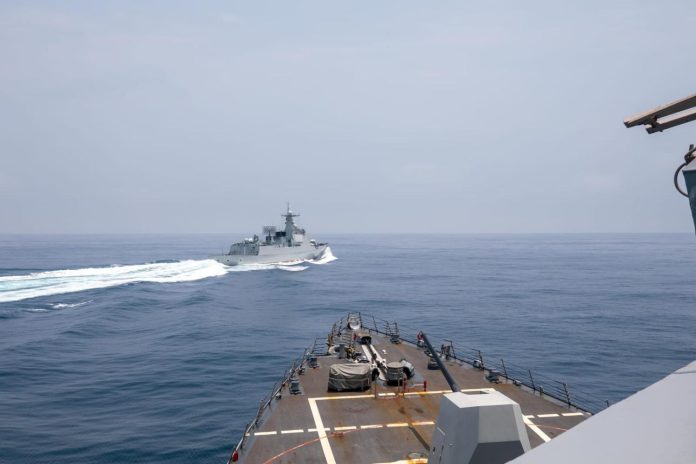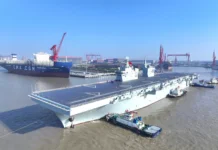
By Laura Bonsover*
Hsiao Bi-khim, Vice President of Taiwan, made history with her visit to the European Parliament last week. This was the first time a sitting Taiwanese vice president – or indeed any Taiwanese leader of such high rank – had addressed the chamber. In her speech to parliamentarians, Hsiao argued that Taiwan is a partner, not a problem. She is right. (From: Britain’s World.)
A military crisis in the Taiwan Strait would be a serious global security threat, which rightly commands attention. However, reducing Taiwan to a mere cross-strait issue limits European perceptions. Instead, it ought to be seen as a global partner and a key player in the Indo-Pacific.
In recent years, European countries have been repositioning their foreign policy focus to the Indo-Pacific in recognition of the region’s growing geopolitical importance. In 2018, France launched its Indo-Pacific strategy. It was followed by Germany in 2020, both the United Kingdom (UK) and the European Union (EU) in 2021, Lithuania in 2022 and Czechia in 2023. Additionally, over this period, many Free Trade Agreements (FTAs) have been agreed between the EU and Indo-Pacific countries, alongside bilateral and multilateral partnerships in security and defence, climate and energy cooperation, and digital governance. However, Taiwan appears to be largely absent from these.
Indeed, in the most recent British and French flagship strategies, Taiwan appears almost exclusively within the phrase ‘Taiwan Strait’; being confined to the context of the ‘Taiwan issue’ and potential conflict with the People’s Republic of China (PRC). Meanwhile, think tank reports on the UK’s role in the Indo-Pacific only mention Taiwan in passing – as an island under threat – while promoting strategic and economically beneficial partnerships with other countries in the region.
Policymakers in European capitals likely know of Taiwan’s democratic credentials, with the country being ranked first in Asia. However, they may not appreciate Taipei’s efforts to support civil society, human rights activism and election monitoring…
This is a missed opportunity, as Taiwan has recently been expanding its role in the Indo-Pacific. The Taiwanese government’s New Southbound Policy Plus (NSP+) aims to promote regional investment, talent exchange and resource sharing through collaboration between government, business and civil society. Already, since the launch of the NSP+, the Taiwan-Asia Exchange Foundation has facilitated regional dialogue between Non-Governmental Organisations (NGOs), research institutes and the region’s future leaders.
Policymakers in European capitals likely know of Taiwan’s democratic credentials, with the country being ranked first in Asia. However, they may not appreciate Taipei’s efforts to support civil society, human rights activism and election monitoring in Asia, nor know how Taiwan’s think tanks facilitate youth empowerment, media literacy and disinformation resilience initiatives with neighbouring nations.
With expertise in countering interference from authoritarian adversaries, Taiwan has highly advanced systems in place for managing cyber threats, making it a model for democratised technology innovation. Government task forces and experts are sent around Asia to deliver Artificial Intelligence (AI) technology adoption training, offering capacity-building and policy workshops to regional neighbours. Here, there is already scope for collaboration between Taiwan and European countries.
In addition to values, both Taiwan and Europe share security and economic interests. When it comes to gaining European support and investment, these shared interests can be stronger drivers than democracy alone, building a foundation for more robust partnerships.
As Taiwan develops its own fleet of indigenous drones, Europe’s militaries can learn from its efforts to diversify production away from the PRC.
As Hsiao said in her speech, Taiwan and European countries are facing a shared set of ‘expanding, coordinated and evolving’ threats. With countries striving to strengthen their systems against these threats, tapping into Taiwanese frontline cybersecurity experience – honed through constant defence against sophisticated cyber threats – can strengthen European nations’ digital resilience, anticipate emerging attack patterns and build more adaptive, real-time defence systems across critical infrastructure. The 2023 EU-Taiwan Cybersecurity Seminar and evidence on disinformation presented to the UK Foreign Affairs Committee in the House of Commons show there is an appetite for such knowledge sharing.
Taipei is also reinforcing the link between Euro-Atlantic and Indo-Pacific security. For example, Taiwan has assisted Ukraine against Russia’s full-scale invasion, including by providing aid, vehicles, Uncrewed Aerial Vehicle (UAV) technology and reconstruction projects. As Taiwan develops its own fleet of indigenous drones, Europe’s militaries can learn from its efforts to diversify production away from the PRC.
While well-known in the region, Taiwan’s work as a hub for disaster training may be less familiar to audiences further afield. Its National Fire Agency (NFA) is an illustrative case of leadership in training. With renowned expertise in rapid disaster response systems, the NFA trains around 300,000 domestic and international firefighters per year, making it the largest firefighting training centre in Asia. Learning from Taiwan’s technologically advanced infrastructure and ‘whole-of-society resilience’ civil preparedness training programmes could boost European countries’ ability to respond to national emergencies and withstand extreme climate-related shocks.
Another pillar of security and economic dependence, of which Europeans see only half the picture, is the Taiwan Semiconductor Manufacturing Company (TSMC) – the world’s leading semiconductor manufacturer. Beyond acknowledging TSMC’s vital importance to their supply chains, European countries can further harness Taiwan’s dominance in such technology by boosting opportunities for joint research and partnerships. Taiwan’s semiconductor industry has the capacity to become a key partner in advancing green tech development, and its expertise in AI can strengthen Europe’s ecosystems. Expanding Research and Development (R&D) and talent in the semiconductor industry at home is an economic multiplier, generating high-paying jobs, increasing strategic autonomy, attracting foreign tech investment and leveraging a country’s bargaining power.
Additionally, European policymakers should not undervalue the vast and largely untapped opportunities for technology collaboration beyond semiconductors. As one of the most technologically advanced societies in the Indo-Pacific, Taiwan is also taking the lead in e-governance and AI-driven public services. Positioning itself as a trailblazer for smart infrastructure development, it hosts the Smart City Summit and Expo (SCSE), the largest and most influential smart city conference in the region.
Partnering with Taiwan would allow European countries to test and refine smart-city and AI technologies in agile real-world settings, collaborate on ethically governed and citizen-centred AI systems, and gain unique expertise in building resilient, high-performance urban infrastructures. European initiatives, such as the Global Gateway and Horizon Europe, could be leveraged to expand Small and Medium Enterprise (SME) collaboration and technological exchange with Taiwan, which could lead to considerable economic growth and job creation in Europe.
Some nations – for example, Britain, Germany and Czechia – have made recent efforts to deepen engagement with Taiwan in trade and technology, signing agreements and initiatives covering digital trade and green energy as well as science, and paving the way by establishing semiconductor joint skills projects and centres. The UK, for instance, recently established its Enhanced Trade Partnership (ETP) with Taiwan, reflecting how countries can expand economic ties without appearing to challenge Taiwan’s status. These efforts should serve as a blueprint for other countries. They demonstrate that deeper engagement with Taiwan is profitable, and feasible while also balancing relations with the PRC.
The tide is turning in Europe-Taiwan relations. It is time for more European policymakers to move from offering a helping hand to extending a handshake.
As Hsiao put it: ‘These aren’t favours, they’re constructive partnerships. A stronger Taiwan means a more stable Indo-Pacific. And a stable Indo-Pacific will bring about a safer world.’
*Laura Bonsaver is a research fellow and consultant on EU-Taiwan/China relations. She currently leads the Think Tank Collaboration Programme at the Taiwan-Asia Exchange Foundation.



